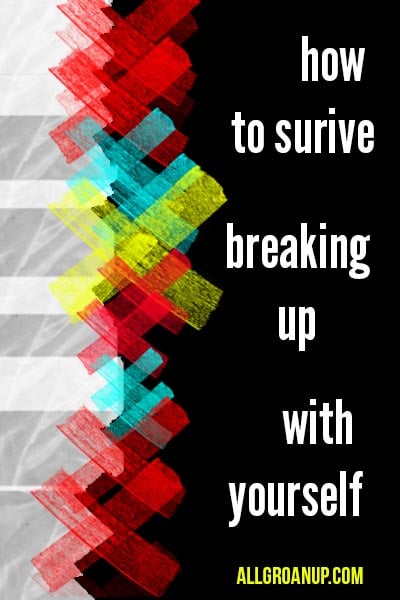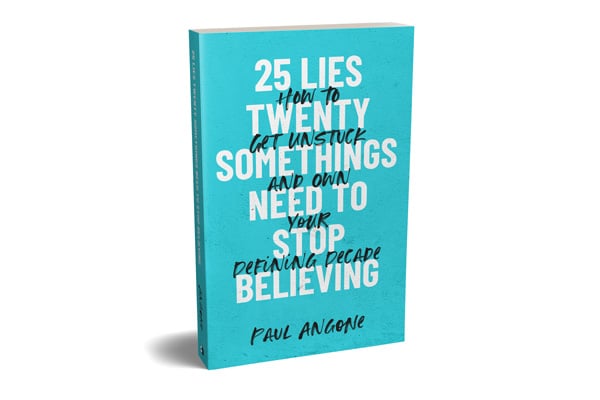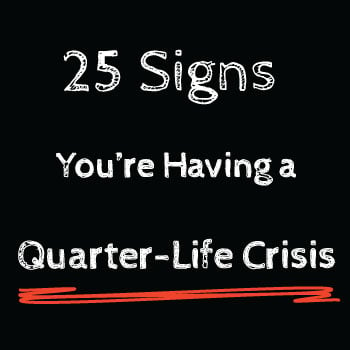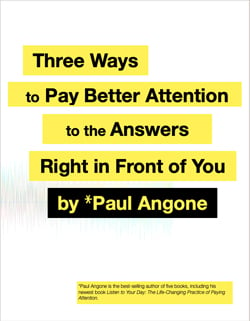Don’t you love breaking up?
Oh you don’t? Oh forgive me, you must be a normal person.
Nobody really enjoys the process and aftermath of breaking up, right? I know I didn’t.
Because you can’t break up without a lot of breaking.
Yet, aren’t life transitions pretty similar?
And the hardest part about it, in life transitions you’re really just breaking up with yourself.
The Breaking Up of Transitions
In transitions, you’re breaking up with who you were during that time of your life. You’re not only leaving a place and a season in life behind, but you’re also leaving a version of you.
 And just like the time the relationship you were so sure about met it’s dramatic end, there’s a real sense of wandering when you leave behind who you were.
And just like the time the relationship you were so sure about met it’s dramatic end, there’s a real sense of wandering when you leave behind who you were.
Sure there’s mementos of you from the past that you’ll carry with you. But the moment you leave who you were is the moment you begin the epic search to find out who you really are.
Twentysomething Transition
Going from college into the working world was the most difficult life transition for me.
So much of my identity was wrapped up around school, striving for good grades, playing sports, immediate feedback, and living in a community of friends.
When I left school, I felt like my identity stayed with it.
Being immersed in the intense ambiguity of transition, especially the transition into the undefinedness that is adulthood, is why I think so many twentysomethings feel like they’re going through a quarter life crisis.
In your twenties there’s a real stark deconstruction of previously understood and held to personal and social beliefs, creating what researchers Atwood and Scholtz defined in their paper The Quarter-life Time Period as “a certain kind of anomie, a state of normlessness, a lack of a blueprint for behavior.”
How many of us have experienced seasons where you want to go back to who you were because who you are doesn’t feel like you?
In life transitions, feeling strangely abnormal becomes the new normal.
So right now where you sit if it feels like you’re going through an identity crisis its probably because you most definitely are.
The old you is a memory, while the new you is yet to be determined.
But there’s a real beauty, and benefits, to an identity crisis that comes only in transition. Let me explain.
There are three things extremely hard: steel, a diamond, and to know one’s self.” –Benjamin Franklin
Three Benefits of an Identity Crisis
1. Lost-ness Leads to Exploration
When the familiar is stripped away, you’re forced to search for more. When you can’t fall-back on the old way of doing things, you have to find a new, better way.
If there were no transitions you’d forever remain where you are now. And being the fiftysomething in first year English is slightly embarrassing.
Life transitions are the usher to the party. You just might not be on the guest list for a while. (click to tweet that)
2. Ambiguity Leads to Humility
When all we thought we were goes up in flames, chasing the smoke of the remains is a humbling experience.
Transitions force you to look at yourself with a new, raw honesty. Seeing yourself as you are. Without the titles and accolades that became all too easy to hide behind.
When you can’t fall back on the stability of success, you have to find out what really sustains you.
When you have no idea where you’re going you’re ready to ask for some directions.
Transitions scrape off the built up arrogance and know-it-all-ness, which gives you the chance to learn fresh and anew.
Life transitions are a great cure for I’m-the-Shizness.
3. A New Relationship Brings New Chances
Breaking up with yourself is hard, yet necessary.
When the aftermath of the transition is over and you start hitting your stride again, you have the chance to do it better this time. You have a fuller idea who you are and what you want in life. You have the chance to be in a more secure relationship with yourself. You have the opportunity to take the breaking that occurred from the break up and form it back together stronger and more stable.
Or you can choose to stay broken. You can choose to be intentional and seek positive change. Or you can become bitter and sit in the very real pain from the past that didn’t go as planned.
Breaking up with yourself does not mean you’re broken. You can break off pieces of yourself while still remaining whole.
You can feel at home while you’re still searching for it.
As I write in my new book All Groan Up: Searching for Searching for Self, Faith, and a Freaking Job!:
“I’m realizing life is not about trying to recapture some idyllic memory of home that never really existed in the first place. Life is not about making it back home; life is about making home right where you are at, with the tribe of people God gave you…It’s taken me way too long to realize that it’s impossible to step into the future if you’re obsessed with the past.”
Like a tree that needs to be transplanted from a small pot to the ground, God loves us too much to leave us “as is” in a place that will ultimately lead to our death. And in this transition, uprooting process, it’s going to take time to find good ground again and let your roots grow deep into the ground.
“In every birth and in every death, God is in fact moving us toward the life he promised; the details just won’t look anything like we expected.” – Paul Angone, All Groan Up: Searching for Self, Faith, and a Freaking Job!
Breaking up is never easy. Especially when it’s with yourself.
But wouldn’t you rather be broken up, than stuck in a dead-end relationship?







Love the way you put things, Paul! Sharing this post with the Future Marriage University (FMU) community at https://www.facebook.com/FMUniversity.